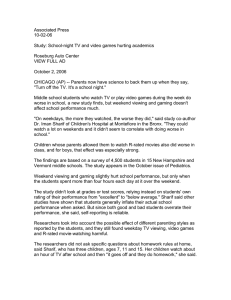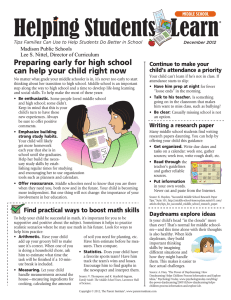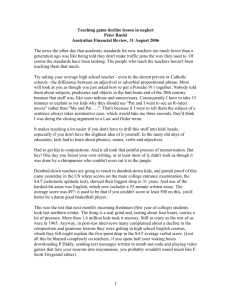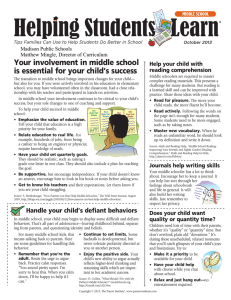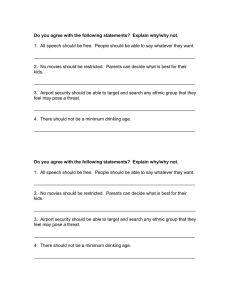Teach your child that respect matters in school and in life
advertisement
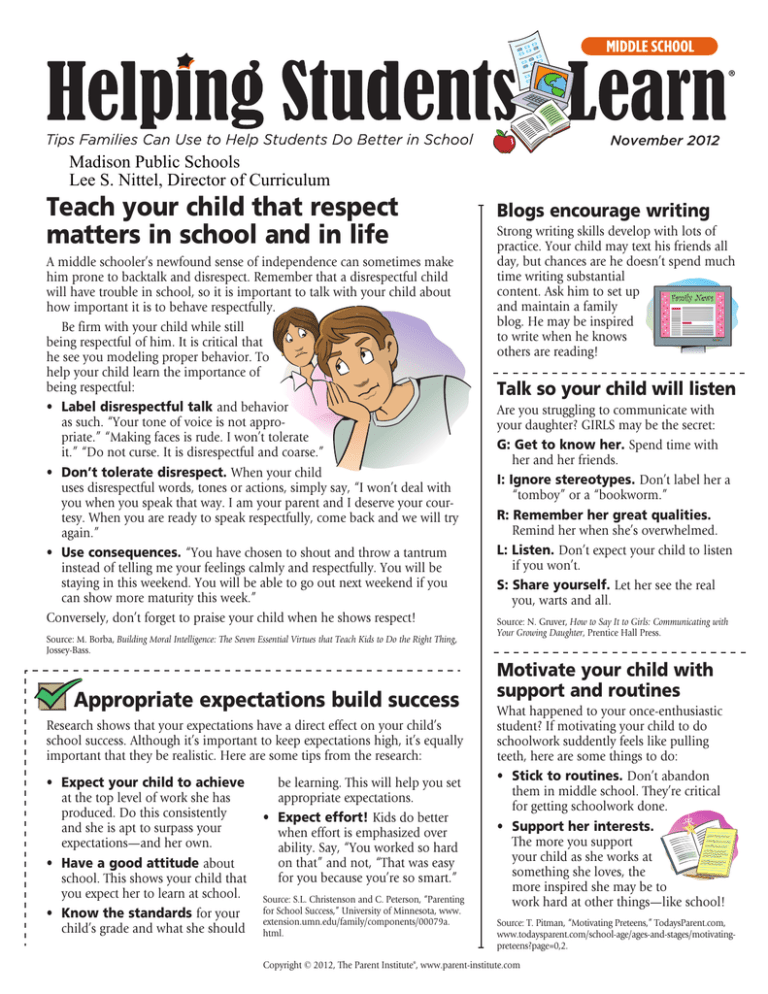
November 2012 Madison Public Schools Lee S. Nittel, Director of Curriculum Teach your child that respect matters in school and in life A middle schooler’s newfound sense of independence can sometimes make him prone to backtalk and disrespect. Remember that a disrespectful child will have trouble in school, so it is important to talk with your child about how important it is to behave respectfully. Be firm with your child while still being respectful of him. It is critical that he see you modeling proper behavior. To help your child learn the importance of being respectful: • Label disrespectful talk and behavior as such. “Your tone of voice is not appropriate.” “Making faces is rude. I won’t tolerate it.” “Do not curse. It is disrespectful and coarse.” • Don’t tolerate disrespect. When your child uses disrespectful words, tones or actions, simply say, “I won’t deal with you when you speak that way. I am your parent and I deserve your courtesy. When you are ready to speak respectfully, come back and we will try again.” • Use consequences. “You have chosen to shout and throw a tantrum instead of telling me your feelings calmly and respectfully. You will be staying in this weekend. You will be able to go out next weekend if you can show more maturity this week.” Conversely, don’t forget to praise your child when he shows respect! Source: M. Borba, Building Moral Intelligence: The Seven Essential Virtues that Teach Kids to Do the Right Thing, Jossey-Bass. Appropriate expectations build success Research shows that your expectations have a direct effect on your child’s school success. Although it’s important to keep expectations high, it’s equally important that they be realistic. Here are some tips from the research: • Expect your child to achieve at the top level of work she has produced. Do this consistently and she is apt to surpass your expectations—and her own. • Have a good attitude about school. This shows your child that you expect her to learn at school. • Know the standards for your child’s grade and what she should be learning. This will help you set appropriate expectations. • Expect effort! Kids do better when effort is emphasized over ability. Say, “You worked so hard on that” and not, “That was easy for you because you’re so smart.” Source: S.L. Christenson and C. Peterson, “Parenting for School Success,” University of Minnesota, www. extension.umn.edu/family/components/00079a. html. Blogs encourage writing Strong writing skills develop with lots of practice. Your child may text his friends all day, but chances are he doesn’t spend much time writing substantial content. Ask him to set up and maintain a family blog. He may be inspired to write when he knows others are reading! Talk so your child will listen Are you struggling to communicate with your daughter? GIRLS may be the secret: G: Get to know her. Spend time with her and her friends. I: Ignore stereotypes. Don’t label her a “tomboy” or a “bookworm.” R: Remember her great qualities. Remind her when she’s overwhelmed. L: Listen. Don’t expect your child to listen if you won’t. S: Share yourself. Let her see the real you, warts and all. Source: N. Gruver, How to Say It to Girls: Communicating with Your Growing Daughter, Prentice Hall Press. Motivate your child with support and routines What happened to your once-enthusiastic student? If motivating your child to do schoolwork suddently feels like pulling teeth, here are some things to do: • Stick to routines. Don’t abandon them in middle school. They’re critical for getting schoolwork done. • Support her interests. The more you support your child as she works at something she loves, the more inspired she may be to work hard at other things—like school! Source: T. Pitman, “Motivating Preteens,” TodaysParent.com, www.todaysparent.com/school-age/ages-and-stages/motivatingpreteens?page=0,2. Copyright © 2012, The Parent Institute®, www.parent-institute.com Consider the link between R movies and alcohol abuse November 2012 How can parents involve children in holiday plans? Q: We’re hosting a family holiday dinner, and my daughter has already developed an attitude about it. I don’t expect her to be as excited about the holidays as she once was, but I do expect her to be nice. What should I do? A: Start by telling her precisely that: She doesn’t have to be enthusiastic about the upcoming get-together, but she does need to behave properly. That way, you’re acknowledging her feelings without giving her a pass to act inappropriately. Then, try to get her involved in the proceedings. You can: • Assign meaningful tasks. Does your child know her way around the kitchen? Put her culinary skills to use! Instead of giving her the vague job of “helping out with dinner,” be specific. “Okay, you’re in charge of baking the pies this year. Let me know what ingredients you’ll need.” • Let her show off a little. Is your child a computer whiz? Ask her to put together a presentation of family photos from previous get-togethers to share with everyone. Maybe she can add sound effects. • Seat her with the adults. Is your child perpetually parked at the kids’ table? Maybe this is the year she can join the adults. Are you aware of the appropriateness of your child’s social media usage? Social media websites, such as Facebook, play a big role in the way many middle schoolers communicate and socialize. Take this quiz to check your awareness of your child’s use of these sites. Asnwer yes for something you do often. Answer no for something you do rarely or never. ___1. I know if my child has accounts on social media sites. ___2. I monitor my child’s accounts. I have his passwords or I am his “friend” on Facebook. ___3. I make it clear to my child that he is never to communicate online with someone he doesn’t already know. ___4. I talk to my child about the public nature of these sites. His postings may be meant for one person, but will be seen by many. ___5. I talk to my child about never posting anything hurtful to or about another person. He knows this is cyberbullying. How did you score? Mostly yes answers mean you are staying on top of your child’s use of social media. For each no, try that idea from the quiz as a way to handle social media use. ou at y h w er is ract .~ dy a h dark ght L. Moo }C e h wi in t —D are Is your child begging to see an R-rated movie because “everyone is going”? Consider this research: Watching R-rated movies may be linked to preteens’ trying alcoholic beverages. According to a study of 10- to 14-year-olds: • Nearly one-fourth of kids who were allowed to watch R-rated movies “all the time” had tried drinking alcohol. Parents did not know about the drinking. • Only three percent of the kids who were “never” allowed to watch R-rated movies had tried alcohol. • Parents’ decisions about other forms of media did not make a difference in trying alcohol. Watching R movies had a greater correlation with trying alcohol. Source: S. Jayson, “Study: Drinking, R-rated films linked in middle-schoolers,” USA Today, www.usatoday.com/news/ health/2010-04-26-rmovies26_ST_N.htm. Bulletin boards can boost your child’s confidence Middle schoolers can be hard on themselves. To help your child build confidence, give her a bulletin board. She can fill it with special things—photos, good grades, notes from friends, etc. Every time she looks at it, she’ll think about the good things in her life. Increase reading in minutes Reading just a few extra minutes a day really adds up. Your child will progress if you: • Enforce reading time. If your child reads 20 minutes a night, six nights a week, he will log more than 100 hours of reading a year. • Turn off the TV. Research shows that after 10 hours of television a week, middle schoolers’ reading ability drops. Source: Jim Trelease, The Read-Aloud Handbook, Penguin Putnam, Inc. Helping Students Learn® Published in English and Spanish, September through May. Publisher: John H. Wherry, Ed.D. Editor: Stacey Marin. Staff Editors: Rebecca Miyares & Erika Beasley. Writer: Erika Beasley. Production Manager: Pat Carter. Translations Editor: Victoria Gaviola. Layout & Illustrations: Maher & Mignella, Cherry Hill, NJ. Copyright © 2012, The Parent Institute®, a division of NIS, Inc. P.O. Box 7474, Fairfax Station, VA 22039-7474 1-800-756-5525 • www.parent-institute.com • ISSN 1526-9272 1527-1021 Copyright © 2012, The Parent Institute®, www.parent-institute.com X02688343
